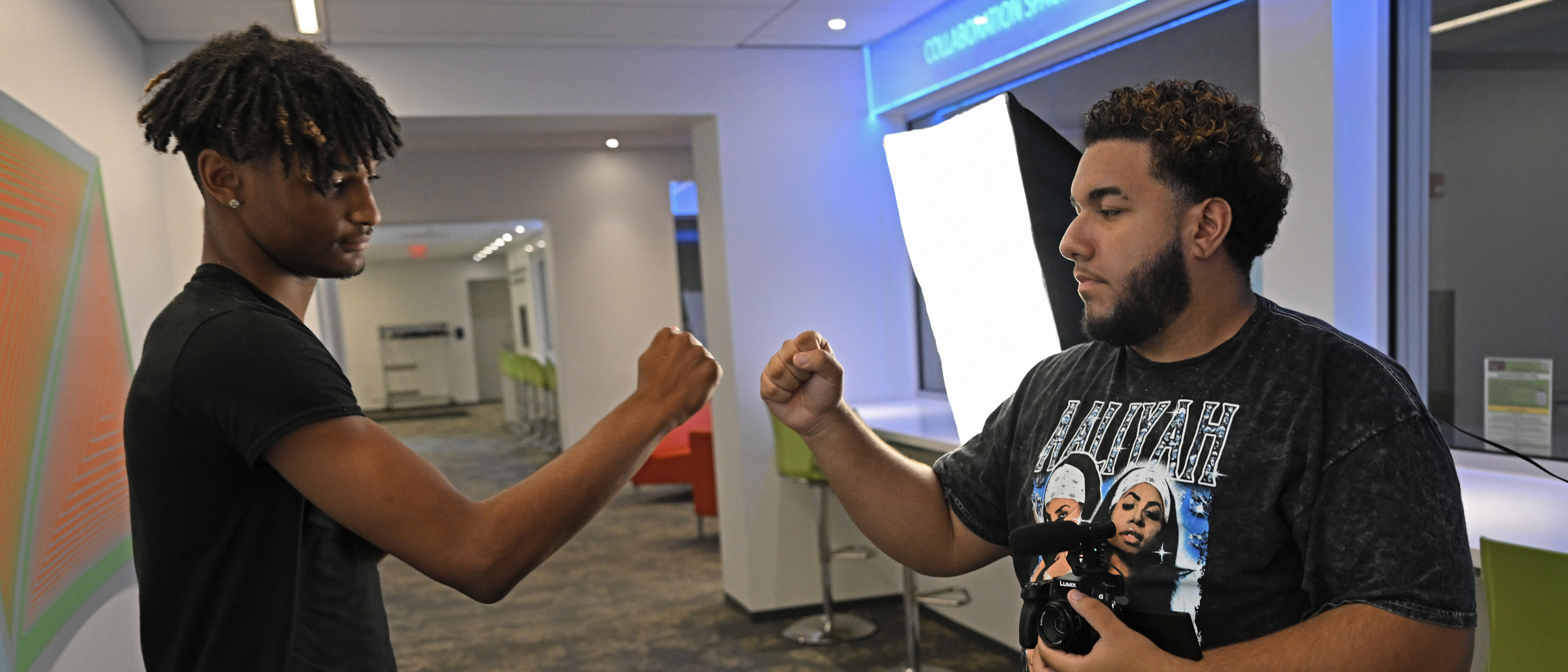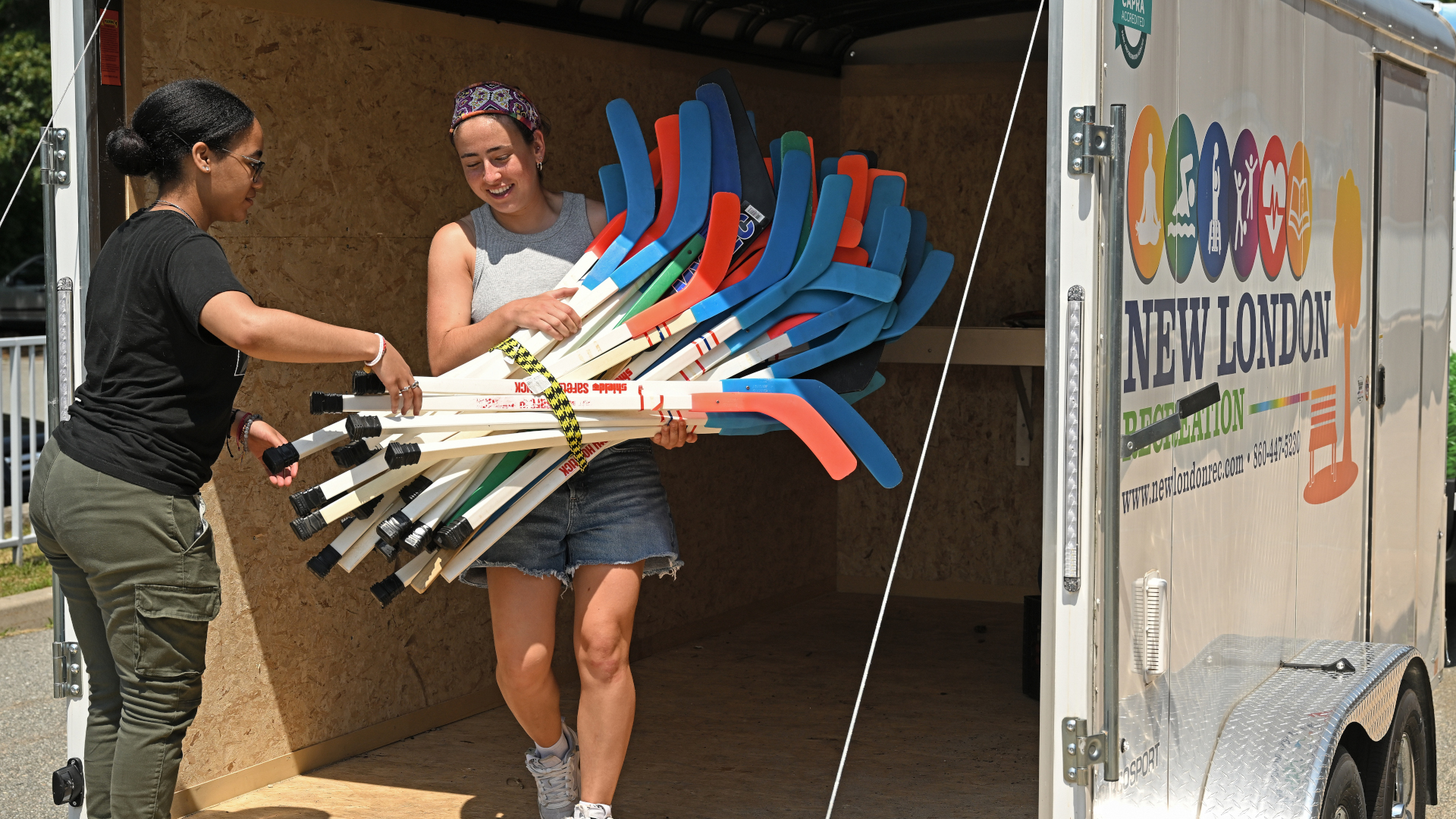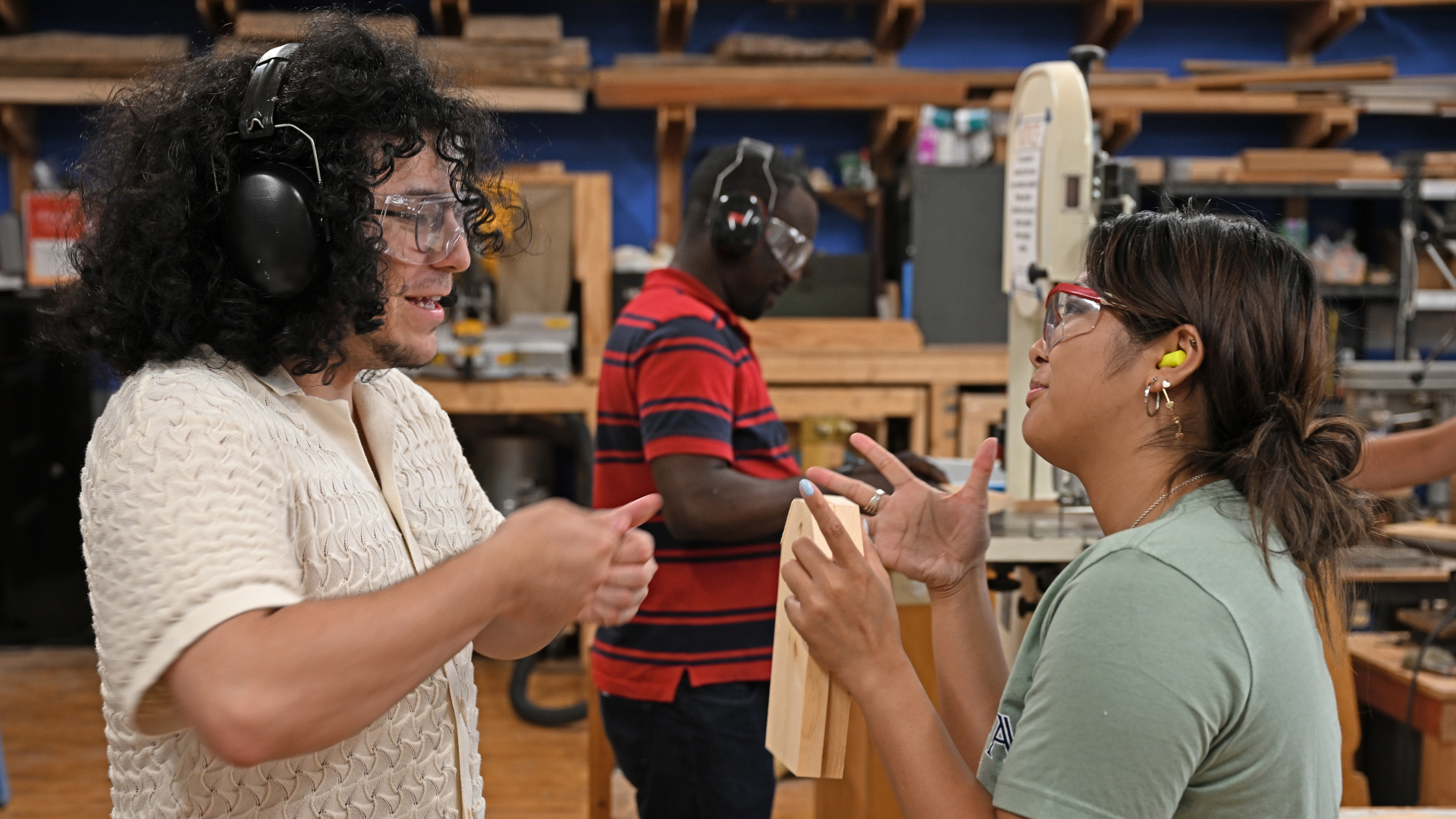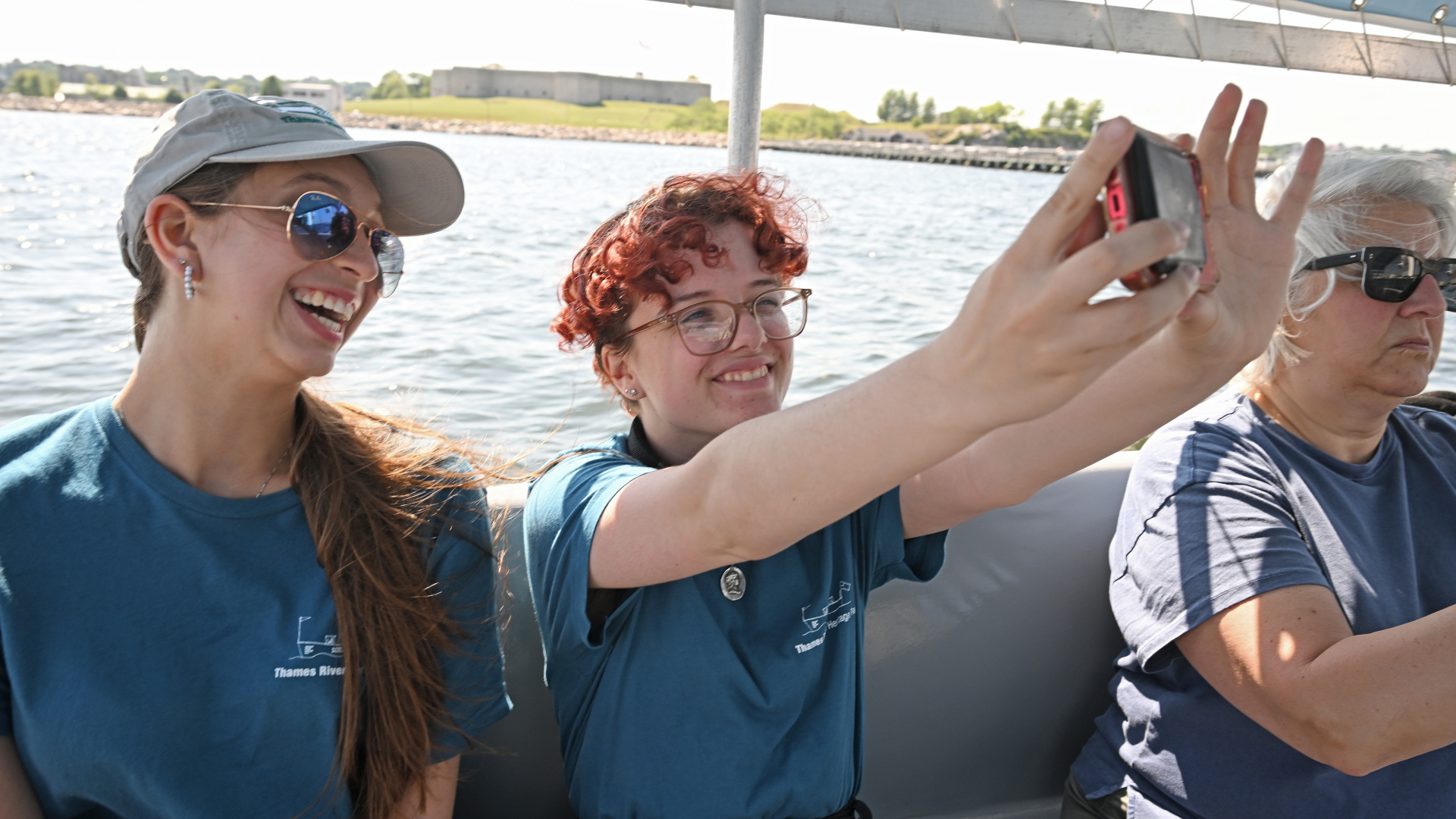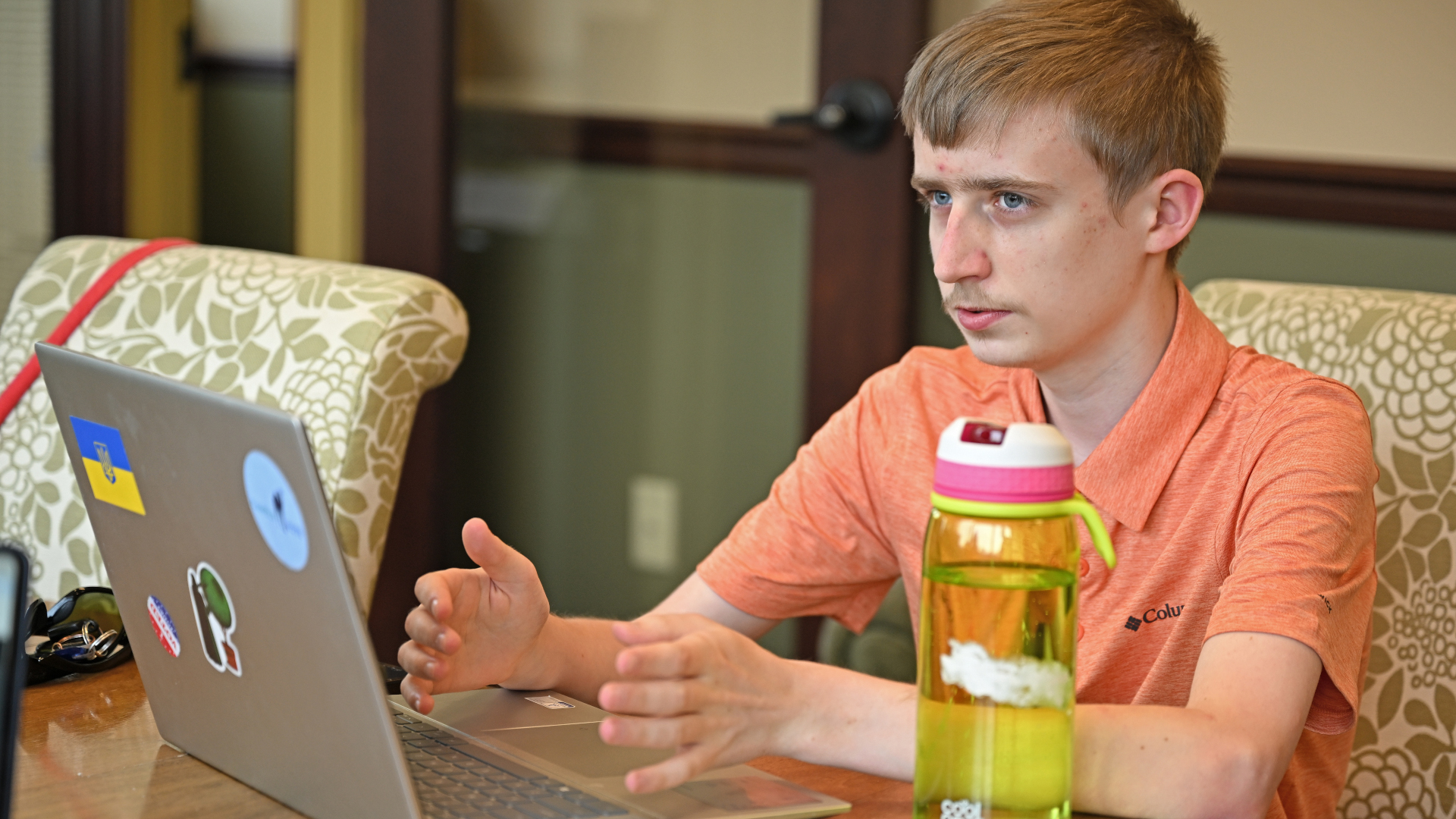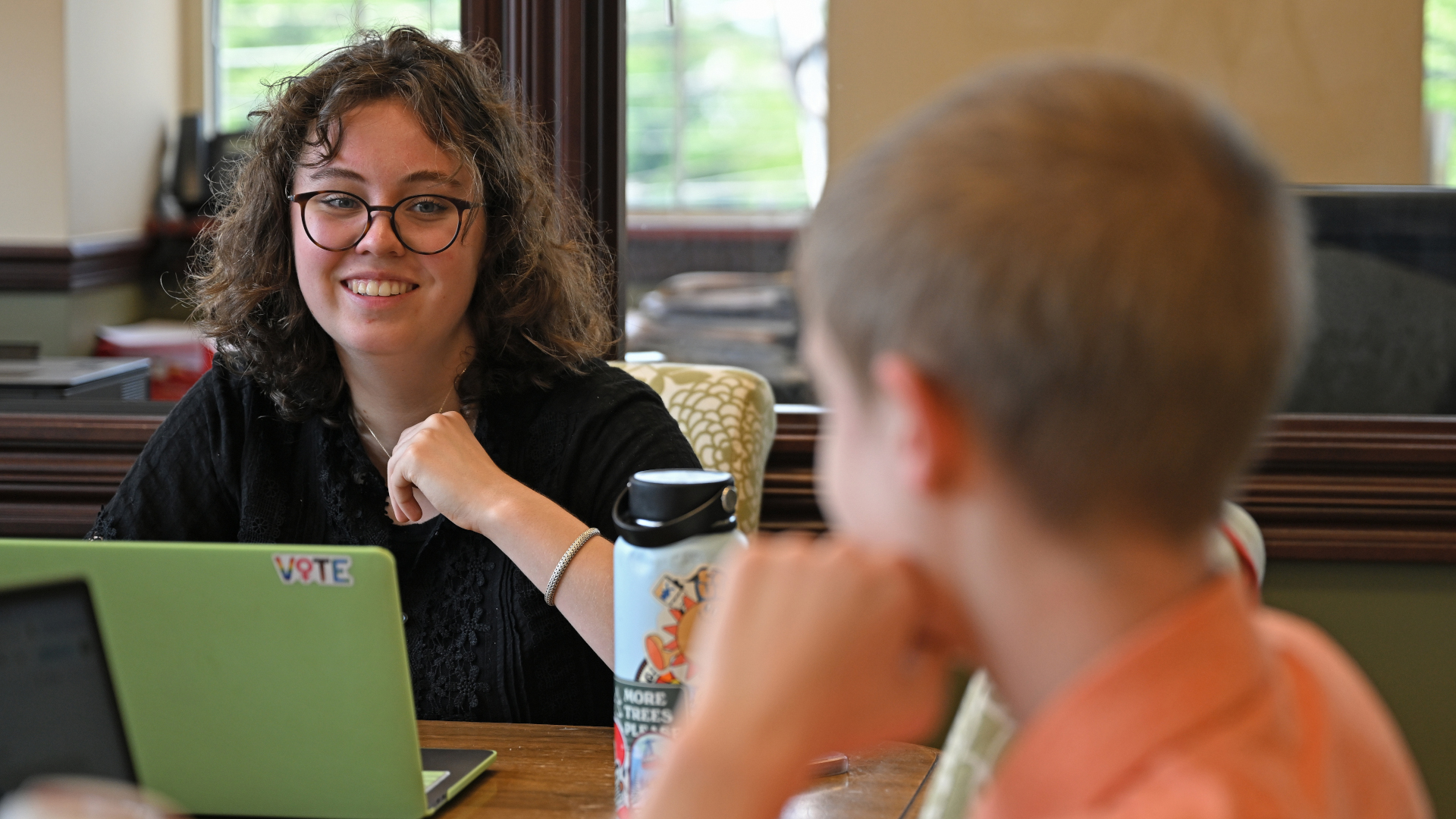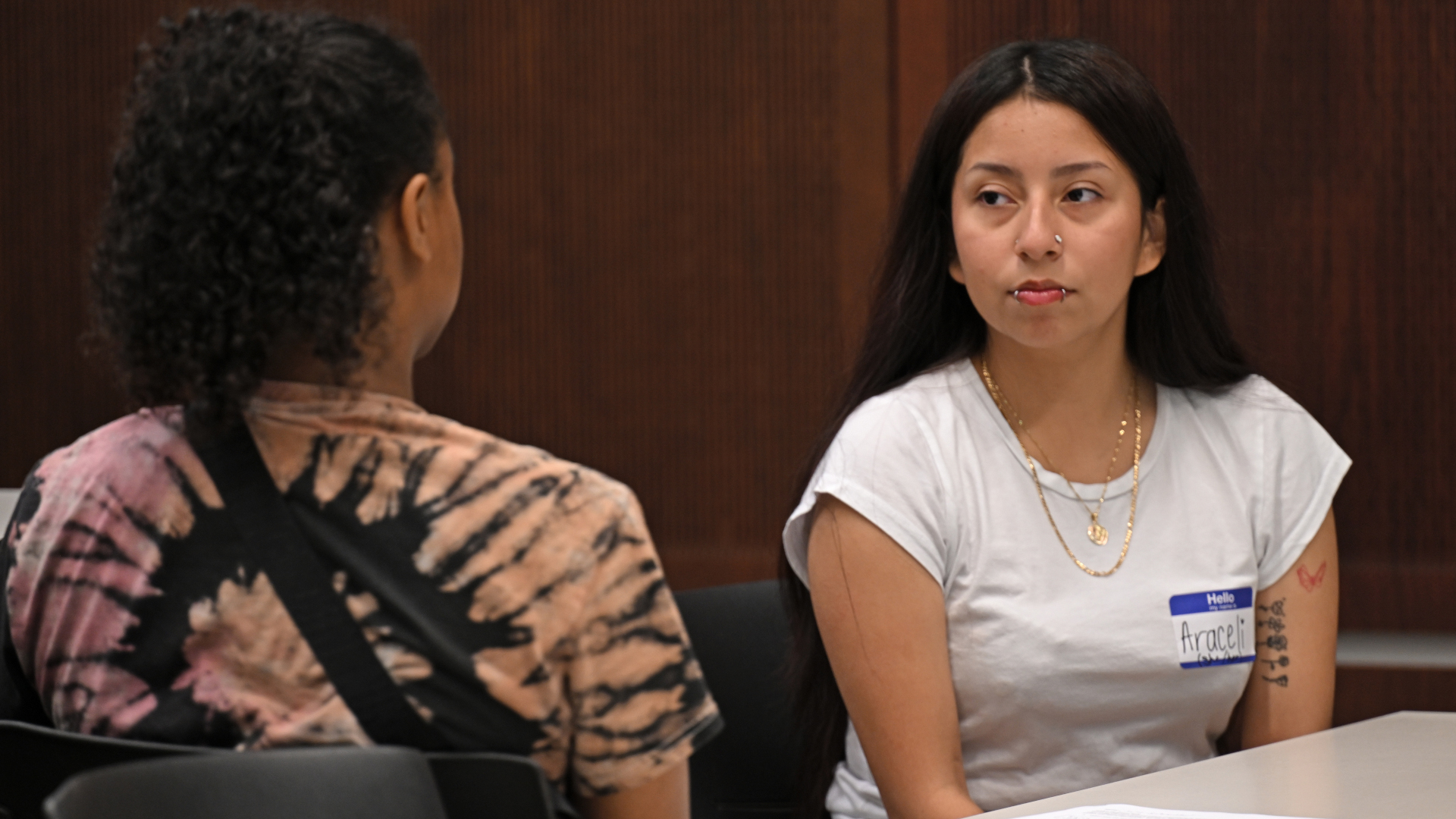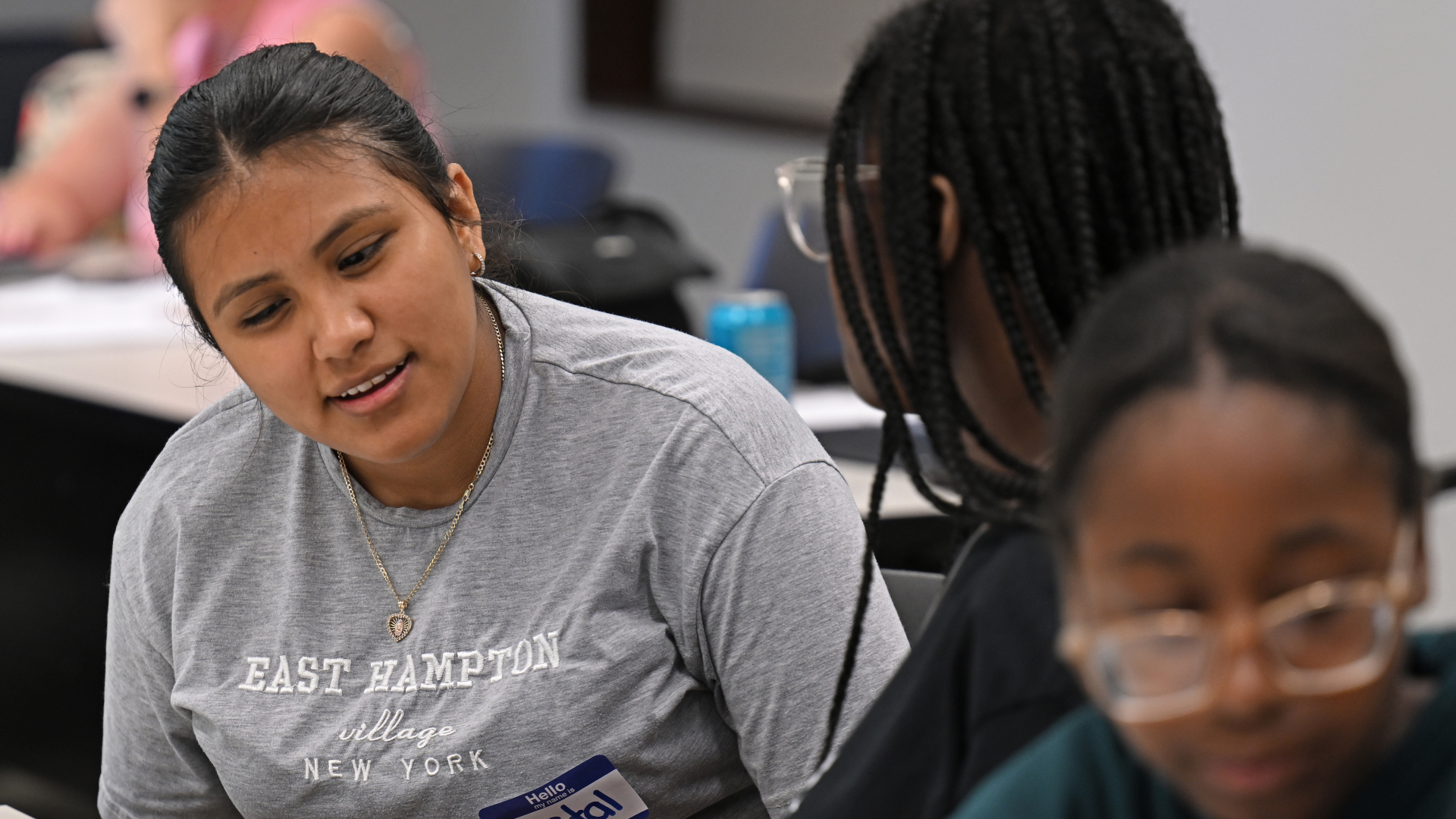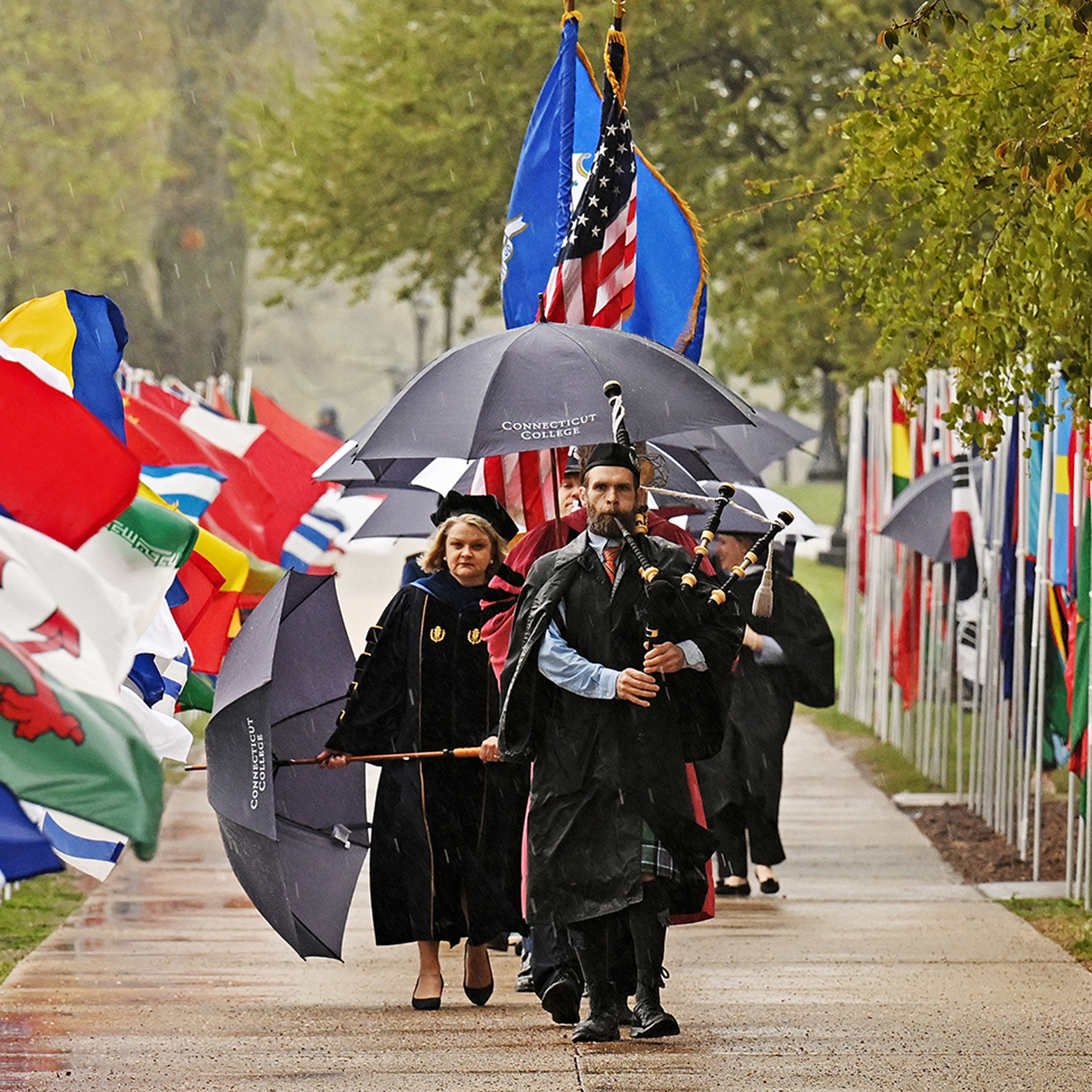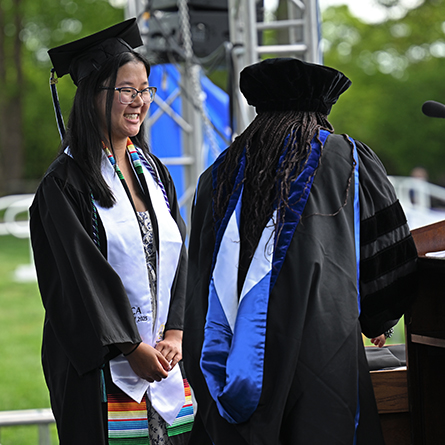
Student Civic Leaders address national issues on a local level
Seventeen Connecticut College students, the largest cohort so far, remained on campus after the end of the spring semester to participate in the annual summer Civic Leaders program at Conn College from May 17 to June 28. Each student received a $2,000 stipend along with housing and food on campus. They were assigned to one of eight partner organizations in New London to address social issues such as education, employment, health, homelessness and racism at a local level.
The competitive program in its fifth year is a partnership between the Community Foundation of Eastern Connecticut and various offices at Conn, including the Office of the Dean of the College and the Holleran Center for Community Action.
Dean of the College Erika Smith kicked off the students’ final presentations on June 28 in Shain Library’s Charles Chu room by expressing gratitude to the Community Foundation for supporting the Civic Leaders. “This program exemplifies the strong commitment between the College and the city of New London,” Smith said.
Rebecca McCue, director of community engagement and Holleran Center operations, explained that the students completed an intensive two-day orientation on campus before starting their six-week internships. They learned about New London’s past and present and engaged in a downtown scavenger hunt to become familiar with local sites. They also learned about principles of ethical and equity-minded community engagement, dialogue skills, professional etiquette, team building, community building, and team and personal goal setting.
“Many of these students are first- and second-year students, so this was a great way for them to get to know their community,” McCue said.
Libby Friedman, assistant dean of the College, believes that one of the true successes of the Civic Leaders program is the relationships between many of the students and their host sites. She said, “Students have continued to work at their sites during the academic year, building on their summer placements. These experiences have shown to be building blocks for the students, in pursuing careers in community, municipal, historic and arts organizations.”
During the internship period, students met for a weekly seminar with Sociology Professor Ronald Flores, faculty director of the Holleran Center, who taught them the difference between a civic leader and a servant leader, theories of social change, ethics of community engagement and more.
In their presentations, students described the organizations’ missions, their projects, challenges they faced and overcame, ways their internships tied into their Conn studies, and plans for future involvement in their cause.
Alliance for Living
Owyn Ledina ’25 from Newtown, Connecticut, and Elvin Li ’27 from Harbin, China, worked with Alliance for Living, the only HIV/AIDS service organization and resource center in southeastern Connecticut that also deals with homelessness and assists people dealing with substance use disorder. It provides medical and non-medical case management, housing assistance, treatment adherence (TAP) assistance, medical nutrition therapy, early HIV intervention and care, HIV testing, a sterile syringes program and a food pantry.
Li and Ledina created flyers, wrote donation request letters, networked and reached out to potential partners. They assembled safe smoking and injection kits and directed clients to food, medical care and medications including methadone and Suboxone.
And because AFL believes fun is an integral part of wellness, the students planned a PRIDE celebration for clients, noting the broad intersection between the queer community and people diagnosed with HIV/AIDS. Li organized and led a makeup station and invited makeup artists and drag performers, with the goal to “reintroduce and reinforce queerness as strength and beauty through artistic expressions including drag and makeup,” he said.
Ledina developed a partnership between AFL and the New London Public Library and invited two librarians to the PRIDE event to share information about the library’s free public resources. Ledina sought to balance practical resources with culturally relevant materials, noting, “In addition to those resources, there are also beautiful stories [at the library] that can speak to some common experiences that a lot of AFL clients have with illness, queerness, race, culture, society and other experiences that might feel alienating. [The books] can reflect those experiences back at them and hopefully make them feel less alone.”
Li called his service “mutual empowerment. It was never one-sided. I was able to find people in the same community who are eager to give me advice and share their stories about being queer. This concept of mutual empowerment will continue to push me and motivate me on the path of public service and human rights activism.”
Center for Housing Equity & Opportunity in Eastern CT
Joshua Caskey ’27 from East Lyme, Connecticut, and Ava Gebhart ’27, from Redding-Red Bluff, California, worked with the Center for Housing Equity & Opportunity in Eastern CT (CHEO), which aligns a diverse coalition of practitioners, policymakers, residents and community organizations to identify and build upon community-driven and data-informed solutions that preserve, protect and produce safe and affordable housing for all. CHEO educates the public on the benefits of affordable housing and focuses on the 52 towns in New London, Tolland and Windham Counties.
Caskey and Gebhart learned about the national housing shortage and a Supreme Court case out of Oregon that criminalizes homelessness. They created educational materials on affordable housing facts and myths and how to contribute to planning and zoning meetings. They also continued CHEO’s Decision-Makers project, a thorough demographic analysis of local land use/zoning decision-makers.
The project entailed collecting and analyzing data on 52 towns and over 1,000 government officials. This data showed that decision-makers are largely not representative of the residents they oversaw, with most being white males older than 40 who lived in affluent areas.
Caskey said his work with CHEO impacted his and Gebhart’s worldview. “It taught us how to discuss important issues that are complex in our communities, such as affordable housing and how it is interconnected between race, social status and other work issues.”
Gebhart, a government major from California, which has county governments, added, “We became more knowledgeable about the localized government in Connecticut, which has its own town governments. We also learned the importance of data’s ability to create narratives. You can't just show people an Excel sheet—data tells so many stories that you should present to people for them to understand it.”
Horizons Beyond High School
Araceli Alcaide ’25 from Bridgeport, Connecticut; Krystal Alvarado Bocanegra ’26 from Houston, Texas and Wilson Hernandez ’26 from New York City, completed their internships in New London High School with Horizons Beyond High School, a 10-day post-secondary success program for BIPOC rising juniors. Students in the program learn about career possibilities, college and military opportunities and much more from guest speakers from area colleges and companies.
Horizons Beyond High School grew out of three years of research and a collaboration with Connecticut College, the New London Public Schools (NLPS) and community partners from a variety of organizations that support youth in New London. The program is led by the Holleran Center with oversight and guidance from a steering committee of partners from NLPS and community-based organizations. It is funded by the Community Foundation of Eastern Connecticut, the Mellon Foundation and the George A. and Grace L. Long Foundation.
Alcaide, Bocanegra and Hernandez, who was in his second year with the program, worked with various organizations, professors and community members in New London to create workshops on crucial life skills including financial planning and budgeting, executive functioning skills, information about area colleges, and how to navigate the job search process as people of color.
The three interns spoke from personal experience. Hernandez, who attended a high school with only Black and Hispanic students, said, “Our mission is to level the playing field. A lot of students in the BIPOC community don't get the resources that they need in schools, especially in comparison to our white counterparts.”
Alcaide said of her predominantly Black and Hispanic high school, “Even though they pushed us to go into college, they didn't support us in a way that helped us stay in college,” she said.
Bocanegra said she became a Civic Leader because “I wanted someone to help this group of students know that there’s possibility outside of the box, and that they’re important.”
New London Homeless Hospitality Center
Sababa Ahmed ’27, from Pabna, Bangladesh, and Julio Ortiz ’25, of Boston, Massachusetts, worked with New London Homeless Hospitality Center, which seeks to provide a place for adults facing homelessness to feel safe and welcomed and aims to be a bridge to permanent housing.
Their internship included the creation of a community survey around housing counseling needs and interests, conducting outreach to local community organizations and schools to provide information on the housing counseling agency's services and resources, and assisting in organizing and facilitating community events and workshops.
Ortiz kicked off the presentation by challenging everyone in the audience to say hello to someone they don’t know. “Through the six weeks that I was in the New London Homeless Hospitality Center, we spent a lot of time saying hello to the community, asking them for an interview, because we wanted to hear their stories. So many people walk in each day asking for help finding a home.”
Ahmed, who shot and edited a documentary and redesigned the center’s website for user-friendliness, said, “As an international student, I have three more years in the city. I wanted to learn more about our culture and history and the people's story here.” She added, “Bangladesh has a lot of people who are homeless. I am planning to give back to my country by taking what I learned over these past six weeks.”
New London Recreation
Noelia De Los Santos ’26 from the Bronx, New York, and Margot Kuller ’26 from Camp Hill, Pennsylvania, interned with New London Recreation, which organizes and hosts a variety of enrichment and recreational activities for city residents of all ages, such as Zumba, yoga and summer camp, to promote access to healthy eating, social services and physical activity.
De Los Santos and Kuller planned, coordinated and developed marketing material for New London Rec’s afternoon and evening classes and helped coordinate the children’s summer camp. Their projects centered on planning, marketing, higher level accreditation, participating in programming to connect with the community, and recording marketing photos and videos.
The interns noted the challenges New London Rec tries to address for New London’s diverse community, including affordability, access to technology, and language accessibility. And as psychology majors, they learned valuable skills that will serve them well as they advance in their field.
“Working here allowed me to explore qualitative research methodology,” Kuller said. “When we were evaluating classes, we interviewed people and were able to take notes and record data, which will help me if I want to conduct research in my future career.”
De Los Santos said, “I was able to see how all the people in our activities value the activities and how they are able to learn social and emotional skills, because they're able to communicate with other people in the community who have their interests.”
Southeastern CT Community Land Trust
Charles McLean ’26 of New Haven, Connecticut, and Grace Webb ’27 from Durham, New Hampshire, worked with the Southeastern CT Community Land Trust. The membership-based nonprofit was incorporated in 2018 in response to the growing housing crisis in New London. The CLT’s goal is to hold land for the development of permanently affordable housing, food production, green space and facilities for community organizations.
McLean created a toolkit for future chapters to follow by researching CLT’s bylaws and systems, general methods used in similar land trusts and nonprofit organizations, community building and historical preservation methods. Meanwhile, Webb visited Norwich City Hall in search of ground leases that CLT could potentially acquire from the now defunct Rose City Community Land Trust. She discovered four Norwich properties that, if acquired, could unlock Housing and Urban Development funding.
McLean said he and Webb examined some New London historical context to understand how the city has developed over the years. They also studied the city’s racial, economic, gender and educational differences to understand where New London most needs help. “There is always going to be some kind of deficit with resources like this,” McLean said. “Working toward minimizing and supporting that is always going to be a challenge, but it's always going to end up being worthwhile.”
Webb reflected, “Home ownership is so much more than just a parcel of land or a house. It’s safety. It’s emotional and physical wellbeing. It's a neighborhood and public schools. It's trust in your community.”
Thames River Heritage Park
Theo Andres ’27 of Glen Ellyn, Illinois, and Angelina Pierro ’27 of Kinnelon, New Jersey, worked with Thames River Heritage Park, a collection of more than 20 national and historic sites along the Thames River in New London and Groton that are linked by a water taxi. The organization offers hop-on and hop-off harbor cruises and historic themed boat tours, as well as a 10-week program called Docent Academy in which scholars and experts teach the history and heritage of the Thames River. Graduates volunteer at one or more partner sites for at least four hours a month for a year.
Andres and Pierro looked into incorporating Docent Academy as a spring semester course in Conn’s Museum Studies Certificate Program. Noting the College’s absence in many discussions about New London’s heritage, as well as the difficulty many students face accessing downtown New London, they also examined what it might take to make the campus one of Heritage Park’s official sites along the water taxi route. They plan to continue their work and enlist other students through an ongoing partnership between Heritage Park and the Holleran Center.
Andres, who is in the Museum Studies program, said, “A lot of this project for me was an opportunity to blend museum theory and physically apply it to community engagement and, whether it's through youth engagement or whether it's through students from the college, having people not just be passive consumers of the heritage sites on boat tours but active participants who have stakes in and passion for the history that is there.”
Pierro, an international relations major, said, “International connections start at the local level. New London especially is a very diverse community with a lot of people from different backgrounds, and to learn from those people and to bring them together is really important and helps me to educate myself and continue along that path.”
Spark Makerspace
Willow Lopez ’26 of Santa Clarita, California, and Rabanne Permelona ’27 from New York, New York, spent the start of their summer with Spark Makerspace, a community workshop and learning center that, for a small monthly fee, provides access to tools, equipment and workspace for creative endeavors including art, woodworking, electronics and more. Spark’s mission is to support makers with the space, equipment, education and community to create a spark in their creativity.
Lopez and Permelona focused on content creation, documentation and interviewing members and local artists. They completed workshops and became familiar with the spaces and what their use requires. They learned about the New London Arts Council, which offers advocacy, resources and networking to local artists, and the many upcoming events and opportunities presented to the council and what it takes to make them happen.
Lopez, a first-generation college student whose mother immigrated to the U.S. from Mexico, described himself as “an artsy little guy.” He said, “My mother came here and wanted to find a place for her son to grow and be financially stable. When you think of the arts, that’s not the first thing you think of. So, being in a makerspace with all these people from different places who are doing fine really resolved a lot of my fear.”
Permelona said, “I wanted to do summer Civic Leaders to be engaged in the community, serving a purpose and helping out. I'm really glad to meet 17 new people from the College. I've also gained connections outside of Conn, which I'm so thankful for. Being a STEM-focused person, I am beyond happy that I was exposed to the arts field because I know that I am talented and can be creative, but it just needed to be sparked.”
